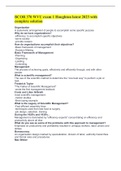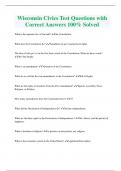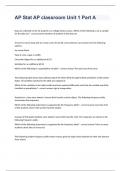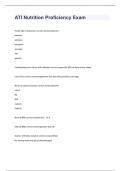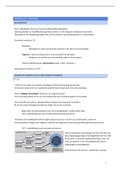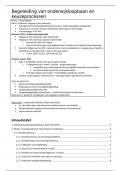PERFORMANCE
PSYCHOLOGY 2023-2024
,Contents
Sport and Performance psychology........................................................................................................3
Lecture 1: General introduction, mental toughness, and motivation.................................................3
Standage & Ryan.............................................................................................................................3
Portenga et al:................................................................................................................................8
Moran & Toner:............................................................................................................................10
Ruser & Steinfeldt.........................................................................................................................13
Beckmann.....................................................................................................................................15
Lecture 2: Perfectionism, goals and self-efficacy..................................................................................18
Hill et. al........................................................................................................................................18
Van Yperen...................................................................................................................................21
Jeong et al.....................................................................................................................................23
Jackson et al..................................................................................................................................29
Lecture 3: Mental health, emotions, and focus................................................................................33
Hobson et al..................................................................................................................................33
Nixdorf et al..................................................................................................................................37
Janelle et al...................................................................................................................................39
Moran & Toner.............................................................................................................................44
Wulf & Lewthwaite.......................................................................................................................49
Lecture 4: Psychological skills training..............................................................................................51
Henriksen......................................................................................................................................51
Reinebo et al.................................................................................................................................54
Bird et al – Performance profiling.................................................................................................56
Fritsch et al – Selftalk and emotions in sport................................................................................57
Guillot et al (2021) - From simulation to motor execution...........................................................58
Lange-Smith et al (2023) - The efficacy of psychological skills training.........................................59
Lecture 5: Expertise development and talent selection....................................................................61
Moran & Toner (2017) - What Lies Beneath the Surface: Investigating Expertise in Sport...........61
Lath et al (2020) – Talent Selection: Making Decision and Prognoses about Athletes..................68
Lecture 6: Team Dynamics................................................................................................................72
Beauchamp et al (2020) – Psychology of group dynamics............................................................72
Fransen et al (2017) – Team confidence in sports........................................................................75
Friesen et al (2021) - The social influence of emotions within sports teams................................77
Lecture 7: New directions: Psychological momentum and resilience...............................................78
1
,Den Hartigh et al. (2020) - Psychological momentum in football: the impact of a last-minute
equalizer in a knock-out match.....................................................................................................78
Den Hartigh et al. (2022) - Resilience in sports: a multidisciplinary, dynamic, and personalized
perspective...................................................................................................................................79
2
, Sport and Performance psychology
Lecture 1: General introduction, mental toughness, and motivation
Standage & Ryan
Introduction:
The term "motivation" is derived from "movere" and involves
understanding what drives people to take action.
The study of motivation encompasses aspects such as energizing,
direction, regulation, and persistence of behavior, particularly in
sport and exercise settings.
Motivation plays a crucial role in the performance, well-being,
learning, and engagement of individuals in sports and exercise.
Complexity of Motivation in Sports and Exercise:
Motivation within sports and exercise settings is highly complex,
involving various types of motivation, both internal and external.
Scholars have shifted from viewing motivation as a single concept
focused on quantity to recognizing different motivational drivers.
Different motives, social contexts, and types of motivation predict
various outcomes in sports and exercise, such as performance and
psychological well-being.
Self-Determination Theory (SDT): Basic Components:
SDT is a meta-theory of motivation, personality, and emotion that
explores motivated behavior in different life domains.
It is rooted in the idea that humans are proactive and self-motivated
individuals who seek optimal challenges and experiences for self-
growth.
The theory emphasizes the interplay between individuals' innate
tendencies and social contexts in shaping motivation.
SDT identifies six mini-theories: Cognitive Evaluation Theory,
Organismic Integration Theory, Causality Orientations Theory, Basic
Psychological Needs Theory, Goal Contents Theory, and
Relationships Motivation Theory.
Basic Psychological Needs in SDT:
A central concept in SDT is the satisfaction or frustration of basic
psychological needs: autonomy, competence, and relatedness.
When these needs are satisfied, individuals experience well-being,
proactivity, and positive development.
Frustration of these needs leads to physical and mental distress,
reduced motivation, and impaired functioning.
3


